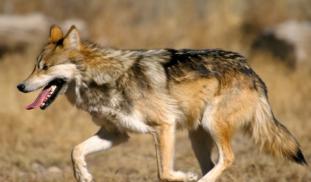Please wait...
About This Project
Wolves play an important role in ecosystem health. When re-introduced into forests like Yellowstone, they helped control elk/deer populations and increased streamside vegetation. Our project aims to non-invasively identify rare and elusive Mexican wolves using their "scent", to get more accurate population count and estimates of age and gender structure. This is critical for informing forest restoration efforts in the Southwest. Backers will be rewarded with seeing the science, as it unfolds!
More Lab Notes From This Project

Browse Other Projects on Experiment
Related Projects
Using eDNA to examine protected California species in streams at Hastings Reserve
Hastings Reserve is home to three streams that provide critical habitat for sensitive native species. Through...
How do polar bears stay healthy on the world's worst diet?
Polar bears survive almost entirely on seal fat. Yet unlike humans who eat high-fat diets, polar bears never...
Uncovering hidden insect diversity associated with a likely undescribed gall-forming midge
Does a likely undescribed species of gall-forming midge (pers. comm. Ray Gagné) on Eriodictyon plants (Yerba...


